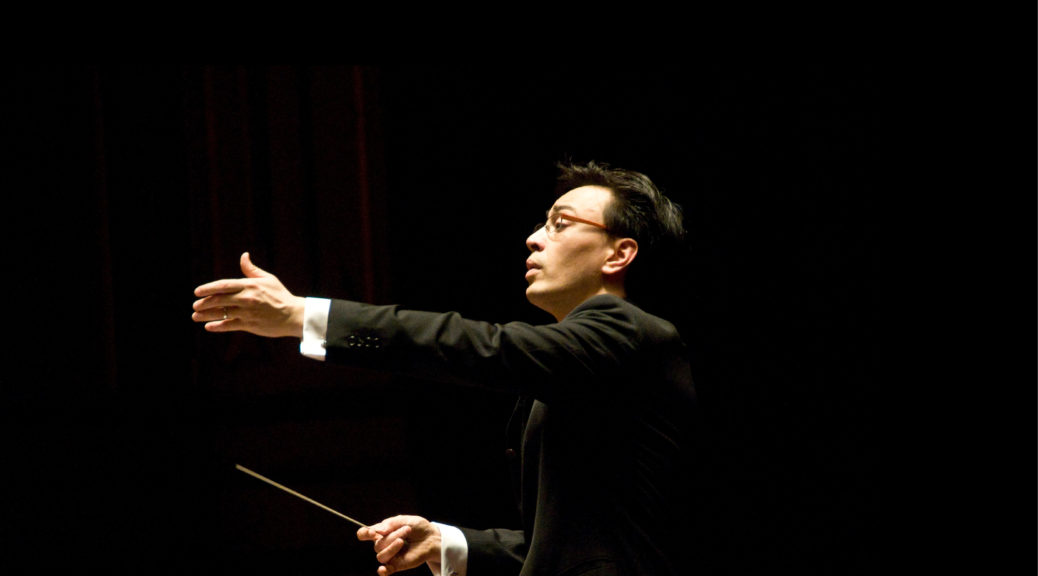
An Off-Season of Invention
During this hopscotch through Covid regulations, the San Francisco Symphony is producing an engrossing off-season of invention. It has not only presented live mini-concerts with new composers to watch, but also served up a smorgasbord of impressive visiting conductors on the way up. In the process of these scaled-down, in-person, string-orchestra evenings, it has broken the lamentable logjam of pandemic lockdowns reigning since March, 2020—far too long for comfort.
Latest of these podium visitors is Ken-David Masur—part German, part Japanese, all American. And on May 27 he brought down the house at Davies with the most sumptuous string sound imaginable in Tchaikovsky’s familiar “Serenade.” Leading with hand gestures rather than baton, the masked conductor evoked from the string players a grand finale following works of two Asian composers, Qigang Chen and Somei Satoh.
Our symphony conductors are hardly alike. Some are Mr. Versatility (conducting-piano-annotating) like Leonard Bernstein. Some are indefatigable presenting new music, like Marin Alsop, MTT and Cristian Macelaru. And yet others produce an enviable patina of rich sonics like the late Eugene Ormandy or von Karajan. Insert in this last category K.-D. Masur, the son of the late East German maestro Kurt Masur, now also the music director of the Milwaukee Symphony.
Masur benefited from our far more customary hearing of “Serenade” from ballet pit orchestras—moderately muffled and remote. Yet how many symphony conductors can evoke that unique high-calorie/low-fat chocolate-ice-cream sound even in full view and sound? Here the 22 string players—less than half the full-orchestra complement— were resplendently visible and audible, a superior ensemble further enriched by the responsive Davies Hall acoustics.
The concert center-piece was “The Distancing” by Qigang Chen, 69, a Parisian stemming earlier from Beijing. He is best known for his music at the Beijing Olympics as well as in the movie “Raises the Red Lantern.” His selection reflected a yearning, perhaps for his land of birth, including the mandatory inclusion of a Chinese folk melody neatly rendered by cello soloist Amos Yang.
Starting and ending in near-silence, the work picks up momentum, with ever sharper accents, then contrapuntal themes offering contrasts—often with the low strings getting the upper hand. Among the less common techniques were glissandos on the cellos, reminiscent of that earlier Parisian composer, Igor Stravinsky. The 17-minute work then fades away in intriguing enigma.
If you were also yearning for a Zen meditation, there was a nine-minute opening exercise in pianissimo slow-motion, “Saga” by the self-taught Japanese composer Somei Satoh. Any risk of falling asleep was minimized by the preceding rousing narration of Mayor London Breed saluting the return of the SFS Strings to action. (“Saga” could have served even more appropriately as a memorial piece to this week’s lamentable loss of life in a San Jose mass shooting.)
The audience, like all the musicians, came masked, with the winds banned until next month. Also the no-intermission concert ran only 80 minutes. But these twice-a-week strings-only musicales are an essential step back toward normal—or, maybe, even better-than-normal!
S.F. Symphony Strings in concert, Ken-David Masur conducting , music of Satoh, Chen, Tchaikovsky. Davies Hall, S.F., May 27-28. For info call (415) 864-6000 or go online: www.sfsymphony.org.